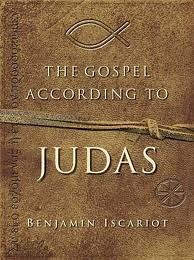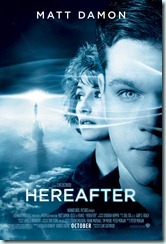Tuesday, March 29, 2011
Book Review: The Gospel According to Judas
Saturday, March 19, 2011
Movie Review: Hereafter
What happens when we die? Unfortunately we don’t have any objective empirical evidence of what happens. We do have many theories – secular, religious, philosophical. Even within religions there can be multiple beliefs about the nature of death. Within Christianity some believe in conscious existence of the soul and others believe in the cessation of consciousness. Some believe in individuals going straight to heaven or hell – literally or metaphorically. The biblical documents are varied in what they describe about death.
Whatever we believe about what happens after death we all have to eventually grapple with its reality. Clint Eastwood’s latest offering, Hereafter, tackles this contentious issue by looking at three people who have experiences related to death. Firstly, there is George (Matt Damon), a blue-collar worker who has a gift of communicating with the dead. But he doesn’t see it as a gift – who would want a life that is dominated by death? For him, it is a curse that has overwhelmed his life and he is trying to repress it and lead a “normal” existence. Second is Marie (Cecile De France) who has a near death experience during a tsunami which shakes her to the core and she sets out to write a book on other people’s experiences of death. And finally, Marcus (Frankie/George McLaren), a schoolboy who loses the closest person to him and who desperately wants answers.
Each of these three people are separately trying to find answers to their questions about death and, eventually, their lives intersect.
Hereafter opens with some incredible scenes representing the 2004 Indian Ocean Tsunami sweeping through a seaside town – poignant given what has been happening in Japan in recent days. Once this dramatic first act is over, the rest of the story takes a less sensational approach but with no less depth and momentum. Each of the characters is well-drawn and the narrative arc that brings them together is believable. Matt Damon once again impresses with his role and the other actors are also believable as the express the grief and disorientation that touches of death produces. But it is Matt Damon’s character that dominates the movie if only because of his prominence as an actor.
I don’t know what Clint Eastwood believes about death and I am not sure that is the point of the film. The final “resolution” of the narrative doesn’t provide any easy answers and it would have ruined the intelligence of the story if it did. Hereafter is more about the way various people cope and navigate their way through what is mostly a taboo subject in Western society. Eastwood directs with a sure and sensitive hand and one leaves the cinema with some deep thinking to do.
Hereafter does, however, suffer from a bias toward the assumption that there is some form of life in the hereafter. At no time do we see what those who do not believe in any form of afterlife grapple with in trying to deal with death. If the story could have included something addressing this it would have been a more balanced story. Additionally, the subtext of the story assumes a rather “new age” perspective – there is little that relates to a specifically religious approach to death.
As entertainment, Hereafter is a pretty good movie. The story moves along at a thoughtful pace and the suspense of waiting for the final intersection of the characters is maintained. While Hereafter doesn’t provide any ultimate answer to the nature of death or the hereafter, it does provoke examination of the issue and there will be many who will resonate with the desperation that people have for answers about death.
For the Christian, of course, the essential point about death is that, in Jesus Christ, death has been overcome – death has been put to death, as it were. Christians assert the historical reality of the resurrection of Christ from the dead as a promise of what awaits the believer after death. Whatever the specifics of the afterlife, Christians maintain a persistent hope that this world is not all there is. There is more to come of all that is all good and the eradication of all that is evil. This belief has brought comfort to millions throughout history.
Hereafter places before the viewer the fact of death and the anxiety that is associated with one of the certainties of life. It raises the questions and, because Eastwood is courageous enough to make the movie he wants to make without pandering to the addiction to tidy resolutions, we are left with more questions than answers. And that is the way it should be with something as mysterious as death.
Positive Review
'What's much more fascinating and enriching is Eastwood's Olympian vision, the sympathetic and all-encompassing understanding of the pain and grandeur of life on earth.' – Mick La Salle/San Francisco Chronicle
Negative Review
'It doesn't help that Eastwood's laconic style is as torpid as it was in such misfires as "Midnight in the Garden of Good and Evil" and "Changeling."' – Joe Neumaier/New York Daily News
Content Advice
mature thematic elements including disturbing disaster and accident images, and brief strong language.
AUS: M
USA: PG-13
Tuesday, March 08, 2011
Movie Review: The Adjustment Bureau
The Adjustment Bureau deals with some deeply philosophical issues in an entertaining and engaging narrative.
David Norris (Matt Damon) is on a fast track to political success when an episode from his past dashes his hopes. But then he meets the beautiful ballerina Elise (Emily Blunt) in a men’s bathroom and falls deeply in love with her. But their love is not meant to be. It is not part of the predetermined plan for David’s life and the Adjustment Bureau is brought in to get his life back on track. David is shocked to discover that the life he thought was his choice is, in fact, nothing more than a manipulation of events according to the plan mapped out for him by the “Chairman” of the Adjustment Bureau. Of course, David is not happy about his life being manipulated – especially when it means he is not supposed to be with Elise – the person who has, for the first time in 25 years, made him feel as though he is not alone. He tries to comply with the plan but finds his love for Elise overwhelming and he decides to take things into his own hands and assert his freedom of choice.
Many Christians believe that God has a plan mapped out for everyone’s life and that God manipulates all events to bring about God’s purposes. Nothing occurs by chance. Whatever happens is as God wills it. Apart from this not being a biblical teaching, it is logically incoherent. And The Adjustment Bureau, while not explicitly mentioning God, pulls apart the implications of this naive view showing what would need to be happening behind the scenes if it was true. Others believe in some vague idea of Fate controlling things and the same implications apply.
It must be said that the story itself is actually quite simple. And it may be that the story will be of more interest to those who have an interest in the philosophical and theological issues surrounding predestination and free will. Damon and Blunt do a good job of their roles with support from members of the Adjustment Bureau that could have been more impactful.
The end of the movie tends to collapse into an insipid assertion that we can have control over our lives by asserting freedom of choice – but that could have been more subtle leaving the viewer to come to these conclusions naturally. I personally like movies that leave me suspended in ambiguity rather than doing the thinking for me (consider, for example, Inception).
 Overall, I found The Adjustment Bureau to be enjoyable, provocative, and contemporary. It has suspense, romance, and intrigue. Even those who do not come from a religious background of predestinarian thinking will benefit from the idea that we can take control of circumstances and assert our freedom of choice.
Overall, I found The Adjustment Bureau to be enjoyable, provocative, and contemporary. It has suspense, romance, and intrigue. Even those who do not come from a religious background of predestinarian thinking will benefit from the idea that we can take control of circumstances and assert our freedom of choice.
Positive Review
'An exhilarating balancing act, at once a science-fiction romp, a paranoid thriller and a philosophical treatise.’ – Calvin Wilson/St Louis Post Dispatch
Negative Review
'There's a startling moment 10 or 15 minutes into The Adjustment Bureau - the only time, really, when the film achieves any level of surprise. The dispiriting dullness of this dreary misfire hasn't had time to settle in and thicken: The movie hasn't yet revealed its utter and thorough ineptitude.’ – Rene Rodrigruez/Miami Herald
Content Advice
brief strong language, some sexuality and a violent image
AUS: M
USA: PG-13


